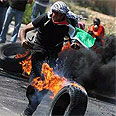
Arab tragedy self-inflicted
Op-ed: Palestinians insist on posing as victims instead of taking responsibility for their catastrophe
In the Israeli collective memory Holocaust Commemoration Day, Memorial Day and Independence Day embody the story of the creation of the modern State of Israel. These three days represent the modern Jewish experience and the mantra propagated by the founding fathers - From Holocaust to Independence - connoting the concept of the enduring Jewish spirit of survival and the promise of Never Again.
Yet the resilience of Jewish-Israeli survival has been overshadowed by the false Arab-Palestinian notion of being “occupied” and “robbed” from their true destiny. Consequently, Israel is the “oppressor “and Palestinian nomenclature demands that the “occupation” remains the root cause of all problems, from social and economic woes to terrorism.
Related stories:
For the anti-Israel community, these days have embodied the Palestinian-Arab narrative, which argues that Israel had a “master plan” to evict the Arabs of Palestine by any means necessary and rob them of their land. Furthermore, the Holocaust in their view was the only reason the State of Israel came to fruition in the aftermath of World War II.
The recurring mantra found in Arab historiography hence maintains a hypersensitive focus on discrimination and inequality. Generally, Arab scholars tend to ignore the huge corpus of materials found in the archives on the war and zoom in on what are legitimate or illegitimate claims, using UN resolutions as the be all and end all.
Arab inferiority complex
The fact of the matter is that the Zionist movement had strived towards a Jewish nation-state years before the rise of the Third Reich and had a consistent presence in the land for thousands of years. By 1939 the Zionist enterprise had all the making of statehood already in place. As Middle East Historian Kenneth Stein details in his book on the subject The land Question in Palestine, 1917-1939, “an analysis of Jewish land acquisition and Arab land sales makes it seem quite evident that a formidable Jewish national territory was necessary and was already present in Palestine in 1939.”
Arab rejectionism and the ongoing attempt to write and rewrite the history of the Arab-Israeli conflict has become a common tool amongst Palestinian sympathizers, and especially the Jewish ones among them. For these reasons Israel’s establishment has been defined as the Nakba Day, that is, the catastrophe of the Jewish state's formation and the realization amongst the Arabs of Palestine that their Arab brethren betrayed them and left them stateless.
Fast forward to 1967. The miraculous military success of the Six-Day War left the Arab world feeling weaker and more vulnerable, and as such, Naksa Day was inaugurated to mark the setback felt by the Arabs and Palestinians in achieving their goal - defeating Israel. This has prompted the Palestinians and sympathizers to insist that they are stateless not because of their own decisions, but rather, because the West and Israel are to blame for all their troubles.
The internal Palestinian conviction chooses to ignore the fact that the so-called Palestinian catastrophe is a self-inflicted one. It is much easier to pose as a victim, especially as part of a more general Arab inferiority complex, and to exploit the mentality of victimhood than to take responsibility for one's own action.
Asaf Romirowsky is an adjunct scholar at the Foundation for Defense of Democracies and Middle East Forum
- Follow Ynetnews on Facebook










